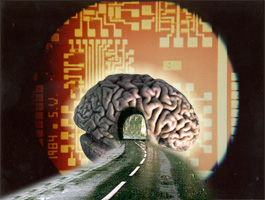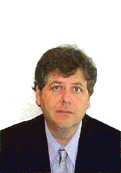
A Personal ReconciliationWhen I first embarked on this journey... taking on the task of a personal reconciliation of the disciplines that have become the focus or perhaps the distractions of my life, most notably art, science, faith, technology and what I describe as spontaneous nonlinear thought, I hoped to find others, who shared those interests. What I have found instead is a bit more than I expected.Google, Yahoo and others bring eyeballs to TheRandomTimes.com for many reasons...
...some may be using the site to settle "bar-bets"
|

|

 Knowing more and more about less and less...
Knowing more and more about less and less...
It begins in kindergarten or preschool. Your teacher knows everything about everything. He or she seems to possess an infinite wealth of knowledge. The teacher reads to you, helps you design and create, helps you cut paper. He or she teaches you numbers, and they know how to play too! Then elementary school starts and the teachers, still seem to know quite a bit about everything, but they don't seem to know quite as much as that kindergarten teacher did... Then middle school or junior high comes along and suddenly; there is a "math teacher" who only teaches you math. There is an "English teacher" who only teaches you English. There is a "history teacher" who only teaches history and so on. Sometimes a couple of your teachers may teach an additional class other than their main class... Then comes high school. Now the teachers really start to focus on smaller things. Your science teacher usually teaches one of many sciences -- biology, chemistry or physics... Your history teachers usually teach one of many history classes -- American History, World History, Ancient History and so on. You get the idea. Yes I know that high school teachers often times teach more than one class... (I was once a high school teacher in a former life -- history and math). Anyway let's move on to college... Professors usually specialize in a specific area of study, but the reality of economics being what it is, even college professors must sometimes teach lower division (general) courses -- but at least they are usually in their subject area. By the time you reach the higher levels of course study, the professors that you encounter are so knowledgeable about such a tiny area of subject matter that it becomes difficult to imagine them carrying on any other mundane human tasks. Then just when it seems there can be no smaller area of study you find that there is yet another expert who is studying or researching yet a smaller area that makes up the previous. Each progression gets smaller and smaller, tighter and tighter until the area of expertise is so small and esoteric that there is no relevance beyond the previous parental area.
Get to the point!!! Jeez!
The point is that at some point we all seek answers to all of our personal fundamental questions -- why am I here? Why do I exist? Why do humans exist? Does God exist? Some questions are philosophical and some are just inquisitive. I submit that faith (or religion) and science (technology) are not at odds with one another. They are one in the same and as they both move ahead, eventually reconciliation will be achieved -- most likely in a way that we cannot currently imagine.In a previous column, I mentioned that "I'm not a scientist" -- though I admire many of them -- especially those with open minds. Personally, I believe in God -- though I don't have a clue as to what form God has -- if indeed it is a form at all. Brought up as a Catholic, I often try to reconcile what I've been taught with other stuff that I've been taught. Am I a "good Catholic?" Is anyone? Does it matter? I respect those who do not share my beliefs or have no belief, as long as they don't dismiss or diminish mine.
"...things that I don't know, may not recall, may never know, may not to want to recall or may not want to know..."
If in fact, we are all part of a larger whole (as it is sometimes said), perhaps as part of that larger whole, we all possess infinite knowledge and perhaps that knowledge is stifled or suppressed or limited by our inability to utilize the entire brain -- it is simply impossible to process it all. There are things that I don't know, may not recall, may never know, may not to want to recall or may not want to know...or perhaps we do know it all, but for whatever reason ... (repeat and fade)
Bibliographic Entry
Gigliotti, Lorenzo. "The Journey Thus Far..." The Random Times Volume 1. #19 (2004):
7 pars. 03 Mar. 2026 <http://www.therandomtimes.com>.
Home
Click to
The quixotic mind of Lorenzo Gigliotti
All rights reserved © 2004 FG Enterprises, Long Beach, California
